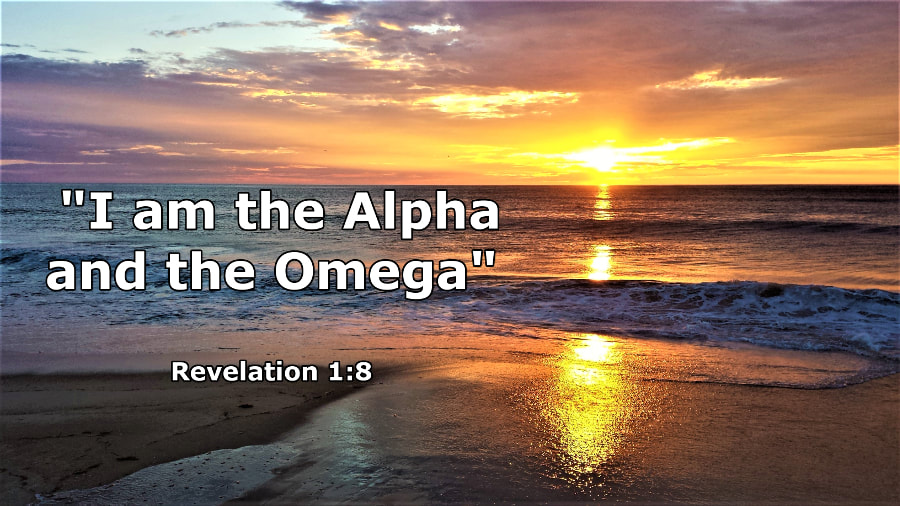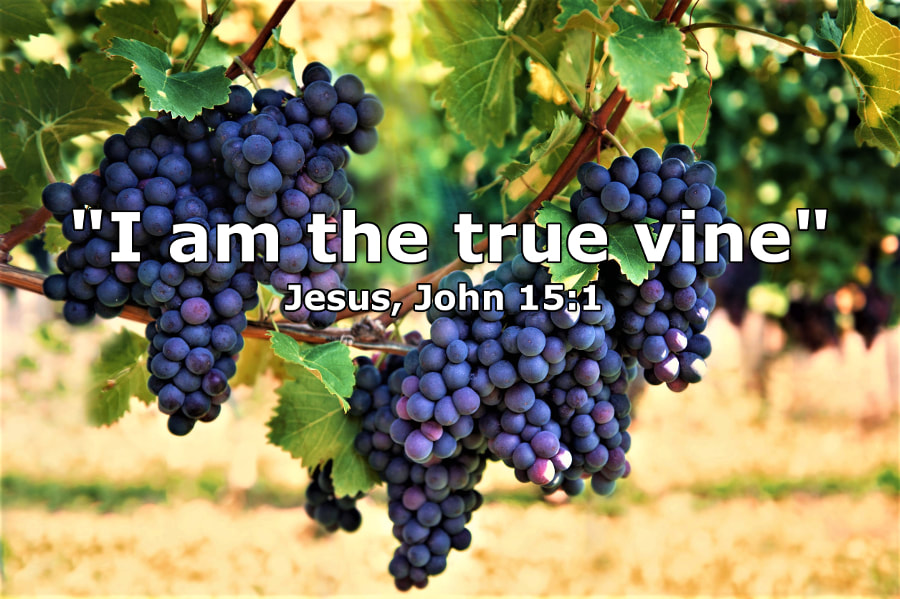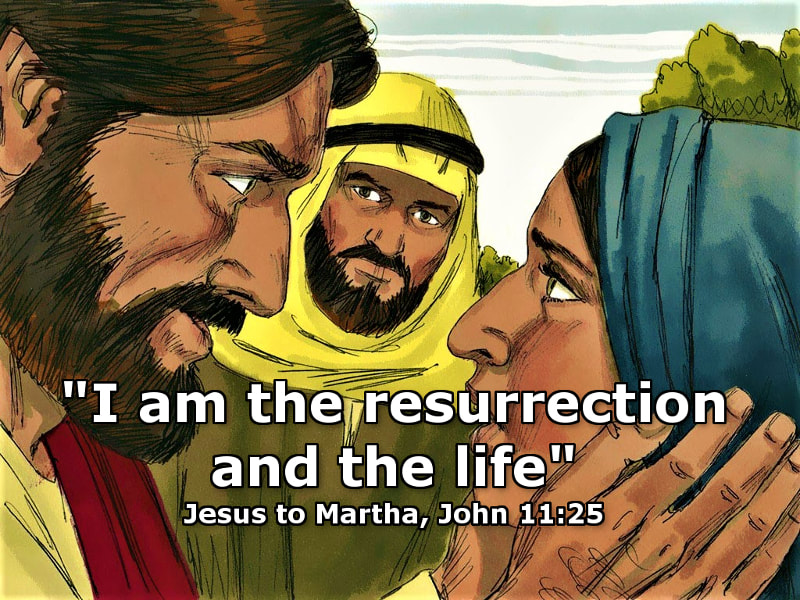"I am the Alpha and the Omega," says the Lord God, "who is and who was and who is to come, the Almighty." (Revelation 1:8)
"When I saw Him, I fell at His feet like a dead man. And He placed His right hand on me, saying, 'Do not be afraid; I am the first and the last, and the living One; and I was dead, and behold, I am alive forevermore, and I have the keys of death and of Hades.' " (Revelation 1:17-18)
"Behold, I am coming quickly, and My reward is with Me, to render to every man according to what he has done. I am the Alpha and the Omega, the first and the last, the beginning and the end." (Revelation 22:12-13)
This lesson is the seventh and final in the series on the "I AM" statements of Christ. Today's lesson discusses Jesus' statements, "I am the Alpha and the Omega" and "I am the first and the last."
Consider. Jesus said, "Do not be afraid, I am the first and the last, and the living One" (Revelation 1:17-18). Consider these comforting words.
Revelation Defined
The writer begins, "The Revelation of Jesus Christ, which God gave Him to show to His bond-servants, the things which must soon take place; and He sent and communicated it by His angel to His bond-servant John ..." (Revelation 1:1). The Greek word for revelation is apokalupsis. Apokalupsis means uncovering or unveiling of truth and divine things previously unknown (Ref. 1). The One who is providing the revelation of things to come is Jesus Christ. The Apostle John is the writer, Jesus Christ the author, of the book (Ref. 2).
"I am the Alpha and the Omega."
Revelation 1:8 begins with the words, "I am." The words "I am" refer to the name of God. When God appeared to Moses in the burning bush, Moses asked God his name. God said to Moses, "I AM WHO I AM" (Exodus 3:13-14). Then God said, "Thus you shall say to the sons of Israel, 'I AM has sent me to you' " (Exodus 3:14). Jesus used the same language in John 8:58, "Truly, truly, I say to you, before Abraham was born, I am." Jesus, the speaker of "I am the Alpha and the Omega" in Revelation 1:8, is the same God who appeared visibly to Moses in the burning bush and said "I AM WHO I AM." Jesus used the same "I am" language when he spoke "I am the light of the world" (John 8:12) and his other "I AM" statements we have studied in this series. For more information about who Jesus is, click on "Who is Jesus?" - Ref. 3. To see a list of the "I AM" statements of Christ, click on Ref. 4.
Alpha (Α) is the first letter, and Omega (Ω) is the last letter in the Greek alphabet. The use of these letters signifies that Christ is the first and last (Ref. 5). In Revelation 22:13, Jesus says, "I am the Alpha and the Omega, the first and the last, the beginning and the end." The language in these verses denotes eternity in the being to whom it is applied (Ref. 6). That language can be used only in reference to the true God. "It means that he is the beginning and the end of all things; that he was at the commencement, and he will be at the close" (Ref. 6). "Do not be afraid, I am the first and the last."
Jesus appeared to John in a vision when John was on the island of Patmos (Revelation 1:9-16). John describes the being that he sees as one "like a son of man" (Revelation 1:13). "His face was like the sun shining in its strength" (Revelation 1:16). In the vision, Jesus said to John, "Do not be afraid; I am the first and the last, and the living One; and I was dead, and behold, I am alive forevermore, and I have the keys of death and of Hades" (Revelation 1:17-18).
Jesus' statement in Revelation 1:17 makes the divine claim, "I am the first and the last." Think about who Jesus is stating he is when he says "I am the first and the last." Read these divine claims in Isaiah:
When Jesus spoke to John in Revelation 1:17, he placed his right hand on John and comforted John with the words, "Do not be afraid; I am the first and the last." The words, "Do not be afraid," are translated as "Fear not" in the King James Version (Revelation 1:17 KJV). "Fear not" is Jesus' comforting message to us. We are to fear not, that is, not be afraid, because for those who believe in Jesus, there is life beyond the grave. Jesus said, "I am he that liveth, and was dead; and, behold, I am alive for evermore, Amen; and have the keys of hell and of death" (Revelation 1:18 KJV).
Apply. Jesus said, "Do not be afraid, I am the first and the last, and the living One" (Revelation 1:17-18). Believe that Jesus is who he says he is. Put your faith and trust in him. Receive the comfort and assurance that only Jesus provides.
References
1. https://biblehub.com/greek/602.htm 2. https://biblehub.com/commentaries/pulpit/revelation/1.htm 3. http://www.ScriptureWay.com/home/who-is-jesus 4. http://www.ScriptureWay.com/bible-verses-i-ams-of-christ 5. https://biblehub.com/commentaries/gill/revelation/1.htm 6. https://biblehub.com/commentaries/barnes/revelation/1.htm
1 Comment
"I am the vine, you are the branches; he who abides in Me and I in him, he bears much fruit, for apart from Me you can do nothing." (John 15:5)
This lesson is the sixth in the series on the "I AM" statements of Christ. Today's lesson discusses Jesus' statements, "I am the true vine" in John 15:1, and "I am the vine" in John 15:5.
Consider. Do you believe that Jesus Christ is the true vine? Are you staying in close relationship with him? Are you bearing much fruit for him?
"I am the true vine."
Jesus had just concluded celebrating Passover with his disciples (John 13:1, 4). The same evening, Jesus said to his disciples, "I am the true vine, and My Father is the vinedresser" (John 15:1). Jesus' disciples likely already knew the vine as the image of Israel from the Old Testament scriptures. Jesus added new meaning to a familiar figure when he said, "I am the true vine" (Ref. 1).
In the Old Testament, the scriptures describe Israel as a vine and as a vineyard which God had planted. The psalmist describes God's people, Israel, as a vine that God removed from Egypt (Psalm 80:1-13). Further, the psalmist asks God to "Look down from heaven and see, and take care of this vine, even the shoot which Your right hand has planted" (Psalm 80:14-15). The prophet Isaiah describes a song in which my "well-beloved" plants a vineyard (Isaiah 5:1-2). The "well-beloved" is the Lord of hosts (Isaiah 5:7). The transliteration of the Hebrew word for Lord is YHVH, the proper name of the God of Israel (Ref. 2). The vineyard is the house of Israel (Isaiah 5:7). Isaiah states that God planted the vineyard with "the choicest vine," and that God expected it to produce "good grapes," but "It only produced worthless ones" (Isaiah 5:2). God "looked for justice, but behold, bloodshed." God looked "for righteousness, but behold, a cry of distress" (Isaiah 5:7). The prophet Jeremiah spoke of the house of Jacob and all the families of the house of Israel (Jeremiah 2:4). "For long ago I broke your yoke and tore off your bonds; but you said, 'I will not serve!' For on every high hill and under every green tree you have lain down as a harlot. Yet I planted you a choice vine, a completely faithful seed. How then have you turned yourself before Me into the degenerate shoots of a foreign vine? (Jeremiah 2:20-21). When Jesus says, "I am the true vine," in John 15:1, he contrasts himself with the degenerate vine which had not fulfilled the purpose God desired. Jesus is the full revelation of God's faithfulness (Ref. 3). "Jesus is the fullest realization of the hope of Israel, of her expectations, of what God had intended her to be" (Ref. 4). "I am the vine, you are the branches."
Note that Jesus repeats his statement, "I am the vine" (John 15:1, John 15:5). Good teachers repeat important principles for their students. The second time, in John 15:5, Jesus adds the application. Jesus said, "I am the vine, you are the branches; he who abides in Me and I in him, he bears much fruit, for apart from Me you can do nothing" (John 15:5).
The Greek word for abide is menó, which means to stay in a given place, state, relation or expectancy (Strong's Exhaustive Concordance - Ref. 5). A branch of a natural grapevine must remain part of the vine in order to live, grow, and bring forth fruit. Likewise, we, as Jesus' disciples, must abide continually in him so that we live, grow, and bring forth fruit. Jesus said that we abide in him by having his word in us (John 15:7), by keeping his commandments (John 15:10), and by abiding in his love (John 15:10). Jesus also said that God prunes us so we will bear more fruit (John 15:2). Fruitfulness is the product of a godly life living in union with Christ. Jesus said, "You will know them by their fruits. Grapes are not gathered from thorn bushes nor figs from thistles, are they? So every good tree bears good fruit, but the bad tree bears bad fruit" (Matthew 7:16-17). The Apostle Paul described the fruit of godly character that the Spirit develops in us when we abide in Christ. "But the fruit of the Spirit is love, joy, peace, patience, kindness, goodness, faithfulness, gentleness, self-control; against such things there is no law" (Galatians 5:22-23). The key to bearing fruit in our Christian life is to abide in close relationship with Jesus Christ, who is the true vine.
Apply. Are you abiding in Christ? Are you bearing fruit for him?
Updated 3 July 2024
Photo source: FreeBibleImages.org
"Jesus said to her, 'I am the resurrection and the life; he who believes in Me will live even if he dies, and everyone who lives and believes in Me will never die. Do you believe this?' " (John 11:25-26)
Consider. Do you believe in Jesus, and do you believe that you will live in him even after your physical death?
This lesson discusses Job's question, "If a man dies, will he live again?," (Job 14:14), and Jesus' answer, "I am the resurrection and the life; he who believes in Me will live even if he dies" (John 11:25).
The scriptures quoted in this lesson are from the New American Standard Bible, 1995 version, unless noted otherwise (Ref. 1).
Job's Question - "If a man dies, will he live again?"
Job asked, "If a man dies, will he live again? All the days of my struggle I will wait until my change comes" (Job 14:14). Job looked forward to a future time when he would be changed and revived from death. The Hebrew word for change in Job 14:14 is chaliphah (pronounced as khal-ee-faw'). Chaliphah means a change of garments (Genesis 45:21-22) as well as revival after death (Job 14:14, Ref. 2).
Job also believed that in a future time in the flesh he would see God. "As for me, I know that my Redeemer lives, and at the last He will take His stand on the earth. Even after my skin is destroyed, Yet from my flesh I shall see God" (Job 19:25-26). Jesus' Answer - "I Am the Resurrection and the Life"
John, the disciple of Jesus, wrote in John 11:1-5 about Jesus receiving news his friend Lazarus was sick. Jesus waited two more days (John 11:6), and then he took his disciples to Bethany, the village of Mary, Martha, and Lazarus (John 11:1). Jesus knew before he traveled to Bethany that Lazarus already was dead (John 11:14).
When Jesus came to Bethany, Martha came out to meet him (John 11:20). Martha said to Jesus, "Lord, if You had been here, my brother would not have died" (John 11:21). Jesus assured her, "Your brother will rise again" (John 11:23). Martha replied to Jesus, "I know that he will rise again in the resurrection on the last day" (John 11:24). The Greek word for resurrection in John 11:24-25 is anastasis (pronounced as an-as'-tas-is), which means standing up again, referring to physical resurrection of the body (Ref. 3). Note that Martha believed in a resurrection - as a future event. Believe in Jesus - Receive Eternal Life
Jesus then turned his discussion with Martha to the present. Jesus told Martha, and these words assure us today -- "I am the resurrection and the life; he who believes in Me will live even if he dies, and everyone who lives and believes in Me will never die. Do you believe this?" (John 11:25-26).
Job's question was, "If a man dies, will he live again?" (Job 14:14). Jesus answered Job's question in the affirmative (yes) and with a promise. Jesus' promise is that when you believe in (trust in, have faith in) him you will live even after your physical death (Ref. 4). Jesus is referring to the eternal life of our soul and spirit which begins during this earthly life when we believe in him, and that eternal life continues with Jesus after our physical death ("What is Eternal Life"- Ref. 5).
Apply. Jesus said to Martha, "I am the resurrection and the life; he who believes in Me will live even if he dies, and everyone who lives and believes in Me will never die" (John 11:25-26). Then Jesus asked Martha, "Do you believe this?" ... (pause) Do you believe this?
Related Lessons and Resources
"What is Eternal Life?" (John 17:3) "Bible Verses About Eternal Life" "Made Alive Together with Christ - A New Quality of Life" (Ephesians 2:45) "Paradise, Jesus, and the Penitent Thief" (Luke 23:42-43) |
Daily Bible Verse(Click the link above) AuthorMr. Whitney V. Myers. Christian. For more information, please visit the Author Page. Posting ScheduleI plan to provide new postings about once a month. Planned Topics(subject to change) Recent Posts(most recent three months) Popular Posts(top 10) Categories
All
Archives
July 2024
|
|
Copyright 2018-2024 Whitney V. Myers |
Listed in Feedspot's Top 100 Bible Study Blogs and Websites |



 RSS Feed
RSS Feed
